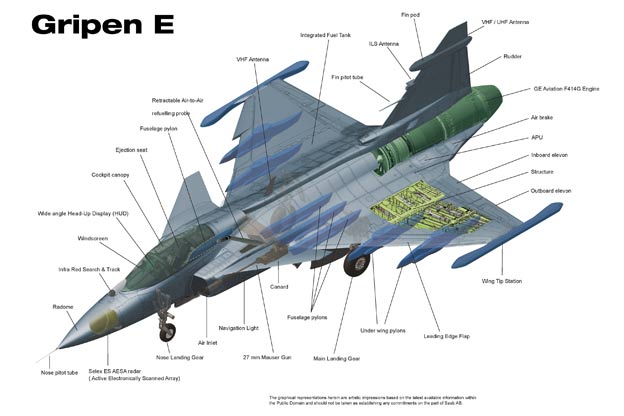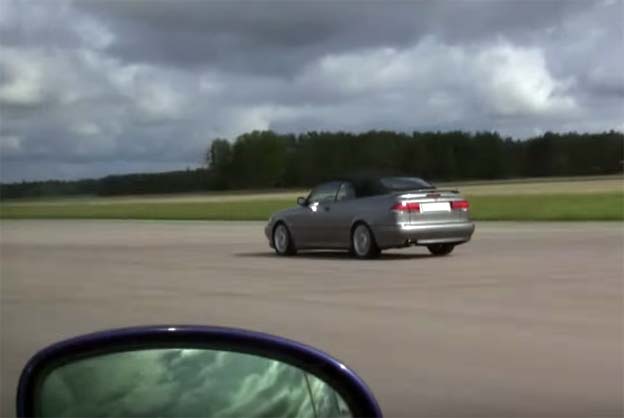Argentina’s Defense Minister Agustin Rossi surprised just about everybody when he announced on Oct. 21 that his government intended to buy 24 Saab Gripen E fighters to re-equip his nation’s ancient Air Force.
But Rossi’s request appeared to ignore a likely insurmountable hurdle to the sale: Britain, its longtime foe, has a near veto on the export of the combat jet as a result of the substantial number of UK systems in the jet. More than 30 percent of the new version of the Gripen being developed by Saab is supplied by British industry.
Selex ES’ key active electronically scanned array radar, landing gear, ejection seat, electronic system and other sub-systems would all be hit by a British block on military exports to Argentina.
British business secretary Vince Cable invoked the ban on the sale of all military and dual-use technology for use by Argentina in 2012. That export license is still in place and will likely remain given the impasse between the two nations over resolving the sovereignty of the Falkland Islands.

“We are determined to ensure that no British-licensable exports or trade have the potential to be used by Argentina to impose an economic blockade on the Falkland Islanders or inhibit their legitimate rights to develop their own economy,” said a spokesperson for the UK Department of Business, Innovation and Skills.
The Argentinean defense minister made the purchase of the aircraft dependent on his country participating in the Gripen E program signed by Saab and the Brazilian government, which will see South America’s biggest nation buy at least 36 fighters.
The deal involves an assembly line set up by Embraer in Brazil, joint development of a two-seat version of the Gripen and an export drive to other South American air forces.
Ironically, the UK government supported the Gripen sale to Brazil due to the high level of British material in the aircraft.
Doug Barrie, the senior air analyst at the International Institute for Strategic Studies in London said that while it would be feasible to replace UK systems on the Gripen, the practicalities are something different.
“Argentina is not flush with money, and the reality is that replacing such key systems as the UK supplies would come with significantly high requalification costs,” he said.
Sources with knowledge of the South American fighter market said Saab has been approached several times over the past few years by the Argentineans over a possible Gripen deal only to be quietly rebuffed by the Swedish company.
A Saab spokesman said the company noted the reports of discussions on Gripen between Brazil and Argentina, but did not have any further information.
“Brazil will become a close partner in the Gripen development and production program. However, all exports of Gripen will continue to be subject to the current, very stringent export regulations,” he said. “In terms of UK equipment on the aircraft, there is no request to change any of this equipment and no plan to do so.”
Rossi’s announcement during a roll-out ceremony of Embraer’s KC-390 airlifter in Brazil caused alarm in Britain, which is in a long-running dispute with Argentina over who owns the Falkland Islands, which Argentina calls the Malivinas Islands.

The issue came up in the UK Parliament last week and the House of Commons defense committee tried to quiz armed forces chiefs on Nov. 5 about the implications for the defense of the islands from a Gripen sale to Argentina.
Argentina invaded the Falkands in 1982, sparking a war with the British. That has resulted in an enduring and costly UK military presence of fighter jets, warships and troops being stationed on the islands since Argentina was defeated.
The dispute has been revived in recent years by Argentinean President Cristina Kirchener, who has made reclaiming the islands a central plank of her policy.
Argentina has been trying to replace the aging fleet of Dassault combat aircraft for some time. Most recently, second-hand Spanish Air Force Mirage F1s were being considered, but that deal has yet to materialize. hasn’t yet come to anything.
Few people are expecting a discussion on Gripen to come to anything, either given Britain’s stance on military export and Argentina’s economic woes. But even if it doesn’t, the issue has raised awareness in Britain of how the military position could change in that part of the world if Argentina was re-equiped with more modern jets and missiles.
Francis Tuser, the editor of Defence Analysis here, said the Gripen issue highlighted that if a deal of this nature went ahead, it would “dramatically and dangerously” change Britain’s situation on the Falklands.
“Although there is a decade-long timeline on this event, it has the capability to change at a stroke, the balance of power in the South Atlantic, and would cause a major change to the UK’s defense posture there,” he said. “If it isn’t addressed in the 2015 strategic defense and security review, then it will have to be addressed as a priority, but that might be too late or at least very expensive.” source: DefenseNews












